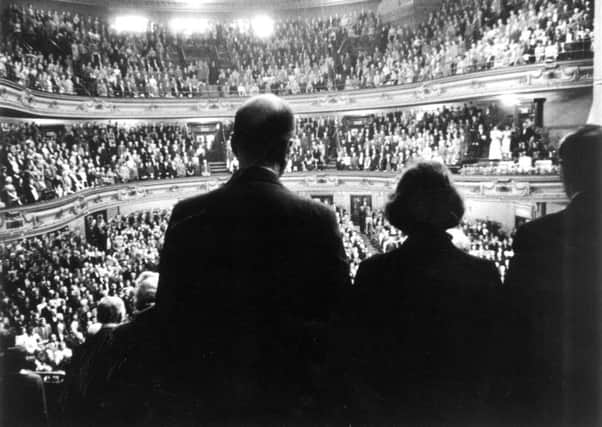On this day: First Edinburgh International Festival


National day of Indonesia.
Independence Day in Gabon
1560: The Confession of the Faith and Doctrine, believed and professed by the Protestants of Scotland, was approved by parliament, establishing the Reformation.
1648: The Battle of Preston began after the Duke of Hamilton led an army of 20,000 into England in support of Charles I. they were defeated by Cromwell – 2,000 were killed, 8,000 captured. Hamilton surrendered on 25 August and was beheaded in March 1649.
1743: Sweden and Russia signed a peace treaty.
1807: Work commenced on building the Bell Rock Lighthouse.
Advertisement
Hide AdAdvertisement
Hide Ad1822: King George IV began a visit to Edinburgh, co-ordinated by Sir Walter Scott.
1891: The electric self-starter for motor vehicles was patented.
1903: Joe Pulitzer donated
$1 million to Columbia University and began the Pulitzer Prizes.
1943: General Patton entered Messina, completing the conquest of Sicily by the Allies.
1946: George Orwell’s Animal Farm was published in the UK.
1947: First Edinburgh International Festival of Music and the Arts opened.
1947: The Radcliffe Line was drawn up, marking the border between India and Pakistan
1978: The first transatlantic balloon crossing was completed in five days by three Americans when the huge black-and-silver balloon Double Eagle II landed in Normandy, France.
1982: The first compact discs were released to the public in West Germany.
Advertisement
Hide AdAdvertisement
Hide Ad1986: Rescuers continued evacuating by boat more than 100,000 people marooned in flood-swept south-eastern India.
1988: Pakistan president Muhammad Zia ul-Haq and US ambassador Arnold Raphael were killed in a plane crash.
1999: A 7.4-magnitude earthquake struck Izmit, Turkey, killing more than 17,000 and injuring 44,000.
2008: American swimmer Michael Phelps won his eighth Olympic gold medal of the Beijing Games to beat Mark Spitz’s 1972 record of seven.
2013: Eighteen people were killed in a conflict between Boko Haram and the Nigerian military.
BIRTHDAYS
John Humphrys, broadcaster, 72; Belinda Carlisle, singer, 57; Robin Cousins, ice-skater, 58; Robert De Niro, actor, 72; Thierry Henry, footballer, 38; Graham McCourt, racehorse trainer, 56; Sir Vidia (VS) Naipaul, Nobel prize-winning novelist, 83; Sean Penn, actor and director, 55; Nelson Piquet, three times world motor racing champion, 63; Kevin Rowland, singer songwriter (Dexys Midnight Runners), 62; Maureen O’Hara, actress, 95; Claire Richards, singer-songwriter and dancer (lead singer of Steps), 38; Guillermo Vilas, Grand Slam-winning tennis player, 63; Alan Minter, former world middleweight champion boxer, 64; Abu Bakar Bashir, Muslim cleric, 77; Anthony Valentine, actor, 76.
ANNIVERSARIES
Births: 1851 Henry Drummond, Scottish evangelist, writer and historian; 1870 Frederick Russell. army doctor who perfected first successful typhoid vaccine; 1892 Mae West, film actress; 1926 George Melly, blues and jazz singer; 1930 Ted Hughes, poet laureate; 1934 Bill McCue, singer; 1944 Bobby Murdoch, Celtic Lisbon Lion football player.
Deaths: 1809 Matthew Boulton, engineer; 1983 Ira Gershwin, lyricist and elder brother of George; 1989 Harry Corbett, puppeteer; 1990 Pearl Bailey, actress and singer.
GERMANY AND PEACE TERMS
17 August, 1915
Advertisement
Hide AdAdvertisement
Hide AdTHE following has been circulated by German wireless stations: The North German Gazette officially denies silly stories circulated from London that the Emperor has offered Russia peace terms through the King of Denmark, which were rejected.
The German government would not reject reasonable peace offers, but only when the hostile governments show their readiness to acknowledge the failure of their military undertakings against Germany. The papers generally greet the announcement with satisfaction and declare that it is the height of nonsense to assume that while the German armies are driving the Russians from defeat to defeat and are occupying one big fortress after another, Germany would offer Russia peace terms. One of England’s many mistakes in this war is to insinuate that there is a longing for peace in Germany just at the moment her armies are victorious along the whole line.
• archive.scotsman.com